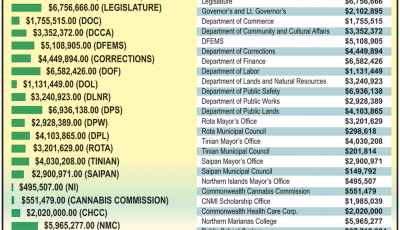Castro claims govt violated his due process rights
OAG says Castro’s last-minute motion is naked attack on integrity of judicial process
Department of Corrections director Gregory Frank Taitano Castro wants the case filed against him dismissed, saying the government violated his due process rights.
Assistant attorney general Jonathan L. Wilberscheid described Castro’s motion to dismiss as a naked attack on court rules and the integrity of the judicial process.
Castro and the Office of the Attorney General offered their arguments in response to Associate Judge Joseph N. Camacho’s order for supplemental briefing on some legal issues.
Castro’s bench trial commenced last July 10, but on that same day the government moved to amend one charge. The request was granted.
After the prosecution called its first witness and asked three questions, defense counsel Rene C. Holmes objected to the citation, stating that it did not provide adequate notice of the charges and thus violated Castro’s right to due process. Holmes moved to dismiss the case and also asked the court to reconsider its ruling regarding amending the citation.
After hearing the motion for two days, Camacho ordered the parties to submit supplemental briefing and continued the trial to Aug. 8, 2017.
In Castro’s supplemental briefing, Holmes said the court should dismiss the entire traffic citation for failure to comply with Castro’s due process rights by failing to provide sufficient notice—no essential elements and no essential facts.
Holmes said Castro recognizes that a dismissal can be a harsh result of an error by the government.
“However, such errors and such results are teaching moments for the government,” Holmes.
The defense counsel said violations of an individual’s constitutional rights should not be tolerated, whether inadvertent or intentional.
Holmes said if the court gives the government a pass, it may not learn the lesson that the violation of the constitutional rights is improper.
Holmes said if, on the other hand, the court dismisses the case, the government is more likely to note the impropriety of its behavior and ensure future compliance with procedural due process.
In the government’s opposition, Wilberscheid said the very purpose of the Traffic Rules and Criminal Rules is to prevent exactly the sort of behavior Castro engaged in.
Wilberscheid said should the court address the merits, then the result should be the same.
He said the citation provides specific reference points to the alleged violations in the Commonwealth Code, as well as the time and place of the allegations.
Because Castro has notice of the charges against him and can plan his defense accordingly, and because the citation provides sufficient facts to prevent future double jeopardy, the charging document is sufficient for constitutional purposes, Wilberscheid said.
“No more is required under U.S. or CNMI Supreme Court precedent,” he added.
He added that the motion to reconsider, because it does not rest on a change in law or fact, or clear error or a manifest injustice, has not provided any basis for being granted.
The prosecutor said because Castro was not prejudicially misled, the amendment of the citation was proper, and helps clarify the issues.
The Office of the Public Auditor allegedly caught Castro using an unmarked DOC vehicle to go to the Marianas Country Club in Marpi in the morning of March 15, 2017, to play golf. The vehicle had a civilian plate number and tinted windows. He allegedly played golf with his brother for three hours.
When Castro returned to his vehicle, he was issued a traffic citation for operating a government vehicle for a purpose other than official government business, operating a government vehicle with tinting on its windows, operating a government vehicle without government identification markings on the front doors, and operating a government vehicle without government license plate.
Castro, 58, pleaded not guilty.


























